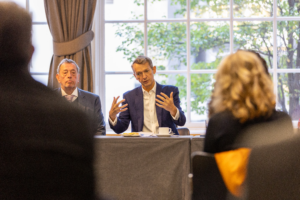FutureLearn invites specialists to create courses in a range of disciplines
- 11 new partners join the leading social learning platform to offer specialist free courses in everything from medicine to digital media
- The UK platform issues a call-out for outstanding research centres, and more specialist education providers, to create courses alongside its existing university partners and iconic cultural organisations
FutureLearn is seeking a broader range of partner institutions to create the highest quality courses in their respective disciplines for the platform’s global community of learners.
The social learning platform has established two new member categories – Centres of Excellence and Specialist Organisations – to open up the partnership to outstanding research centres and specialist education providers, among others. World-class educators from these institutions will create courses alongside existing university partners and cultural institutions, such as the British Council, British Library and British Museum.
11 new partners join FutureLearn in the new categories today, to provide courses across a range of specialisms, including Medicine, Leadership, Digital Media and Complex Systems Science.
They are: Common Purpose; the Complex Systems Digital Campus, established within the UNITWIN/UNESCO Chairs programme; and the Hans Christian Andersen Centre, part of the University of Southern Denmark. Also joining are four centres of research excellence from the University of Wollongong: the Australian Institute of Innovative Materials, the Centre for Archaeological Science, the Early Start Research Institute, and the Graduate School of Medicine. From Queensland University of Technology come the Digital Media Research Centre and the Mathematical Sciences School. Finally, FutureLearn welcomes Italy’s University for Foreigners in Siena (UniStraSi), and Taipei Medical University from Taiwan.
Simon Nelson, Chief Executive of FutureLearn, said: “Quality is the driving force behind the courses we offer on FutureLearn, and we want to work with anyone who can demonstrate a world-class reputation in their specialist area. We have always taken the view that expertise exists across and within various organisations, and demonstrated that with the great learning experiences that have already been offered by our range of existing partners.
“The 11 excellent institutions that join us today are all leaders in their respective fields, and I know our global community of learners will share my excitement at the new courses they will bring to FutureLearn.”
New course creators
FutureLearn has added the following membership categories to recruit new partner institutions.
1. Centres of Excellence: University faculties or research centres which are globally renowned for a particular specialism. These faculties could possess world-class academics in their area of expertise, an excellent research record, or have a known reputation among leaders in their related industry or profession.
The Centres of Excellence joining FutureLearn today are:
- Australian Institute of Innovative Materials (AIIM), a purpose-built institute at the University of Wollongong, that connects world-class researchers, state-of-the-art research and prototyping facilities to help transform multi-functional materials research into commercial reality. AIIM will create courses on Materials Research for FutureLearn, with the first set to begin mid-2016.
- Centre for Archaeological Science (CAS), a high profile research centre at the University of Wollongong, with a world-class reputation for archaeological dating, archaeological chemistry, artefact and residue analysis, archaeobotany, zooarchaeology and palaeontology. Its first course in the area of Archaeological Science will begin on FutureLearn in 2016.
- Digital Media Research Centre, part of Queensland University of Technology. The centre has world-class expertise in digital media; incorporating public communication and democracy, digital media economies, policies and regulation, digital media technologies, and practices and digital methods. Its first course will begin on FutureLearn in 2016.
- Early Start Research Institute (ESRI), another centre of research excellence at the University of Wollongong, working to overcome disadvantage that impacts the lives of children, youth and families through its world-class research. Its first course in the area of Early Years Learning and Development will begin on FutureLearn by the end of 2015.
- Graduate School of Medicine (GSM), also part of the University of Wollongong. GSM focusses on rural, regional and remote medical practice, as well as on medical research. Its first course for FutureLearn in the area of Medicine will begin in early 2016.
- Hans Christian Andersen Centre (HCAC), part of the University of Southern Denmark, and the world’s leading research institution on the author. The HCAC will provide courses in the area of literature and literary research. Its first course – Hans Christian Andersen’s Fairy Tales – will begin on FutureLearn later this year.
- Mathematical Sciences School, also part of Queensland University of Technology. This centre is a world leader in creating innovative theory and methodology in modelling and analysis, at the interface of statistical science, machine learning and computational mathematics, to solve real world problems in health, the environment and society. The first course in this area will begin on FutureLearn in 2016.
2. Specialist Organisations: These are nationally or globally renowned brands in their area of expertise, which have education as a core competency or mission. Their expertise can be demonstrated by their research or significant collaborations with leading universities and the wider industry.
The Specialist Organisations joining FutureLearn today are:
- Common Purpose, one of the biggest independent, international leadership development organisations. It runs local programmes for leaders in cities around the world, and global programmes for leaders from over 100 countries across six continents. Common Purpose will provide courses on leadership skills for FutureLearn. The first, on Cultural Intelligence (CQ), will begin in November 2015.
- Complex Systems Digital Campus (CS-DC) is an initiative within the UNITWIN/UNESCO Chairs programme to advance research, training and programme development in all of UNESCO’s fields of competence. CS-DC is an international network promoting research and education in complex systems science and integrative sciences. The first course from CS-DC, on Global Systems Science and Policy, will launch on FutureLearn in September 2015.
- Taipei Medical University (TMU), one of Taiwan’s best medical universities, leading in research areas including Cancer, Translational Medicine, Neuroregenerative Medicine, Biomedical Devices and Tissue Engineering, Reproductive Medicine and Biomedical Informatics. Its first course for FutureLearn on Translational Medicine will begin in November 2015.
- University for Foreigners in Siena (UniStraSi), an Italian university specialising in language teaching, as well as research on the diffusion of the Italian language and culture in the world. Its first course – an introduction to Italian – will begin on FutureLearn later in 2015.
ENDS


